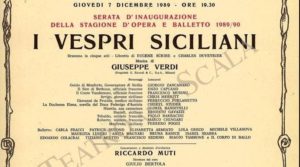
Opera Profile: Verdi’s ‘I Vespri Siciliani’
By David SalazarVerdi’s “I Vespri Siciliani” is something of an oddity.
Composed on the heels of his famous trilogy of “Rigoletto,” “Il Trovatore,” and “La Traviata,” and with a premiere on June 13, 1855, one might have expected that the composer would have up the ante. “Verdi” was excited about the possibility of conquering Paris after coming into such massive artistic maturity, but it never quite happened with “Siciliani” or “Les Vêpres Sicilliennes.” The work is a monumental one in the French style, but it relies heavily on traditional musical structure, a far cry from the nuance and technical advancements Verdi displayed in “La Traviata,” and especially, in “Rigoletto.”
But this piece seems to be gaining some ground in recent years, particularly with the French version being championed at some of the biggest houses there are.
Quick Plot Summary
The Sicilians are unhappy with the French occupation. Elena, who is suffering from the death of her brother wants vengeance. Montforte is the governor of the island and offers the recently imprisoned Arrigo to take up a position in the government as long as he stays away from Elena. But Arrigo, who is in love with Elena, refuses.
Procida arrives in Sicily and gathers his men, along with Elena and Arrigo to plot some uprisings at upcoming festivities. Arrigo swears to avenge the death of Elena’s brother. An invitation arrives to attend a ball. When Arrigo refuses he is arrested. There is some tumult during the festivities, stopping Procida and his men from having much impact. The determine to have their vengeance at the ball.
At the palace, Montforte reveals that Arrigo is his son and the two have a massive confrontation, Arrigo ultimately leaving. At the ball, the rebels seek to kill Montforte, but Arrigo saves him. Everyone else is arrested.
In prison, he seeks out Elena who is none too happy about Arrigo’s actions. But he reveals the truth and sympathizes. Ultimately Arrigo manages to get freedom for his friends and agrees to marry Elena.
Procida tells Elena that the Sicilians will attack during their wedding so, torn, she tells Arrigo that there will be no marriage. Just then, Montforte arrives and marries them, sounding the bells that give the signal for the impending Sicilian attack. Everyone gets killed.
Famous Musical Excerpts
While it certainly doesn’t have the same popularity as other Verdi operas, there are some sections that remain well-known. The overture for one, gets performed quite often and is most famous for the cello melody that is also used during the Montforte-Arrigo duet.
Elena’s two arias, “Arrigo! Ah, parli a un core,” and, especially, the more lively “Mercé, dilette amiche,” are performed in recitals or concerts for sopranos.
Perhaps it is Procida’s “O tu Palermo” that is the most recognized of the works for its nostalgia and devotion to country.
Famous Interpreters
Plácido Domingo has a few recordings of the opera and is one of the major exponents as was Boris Christoff in the role of Procida. In more recent times bass Erwin Schrott has dominated as Procida, though he has performed the French version far more.
Watch or Listen
Riccardo Muti’s recordings from La Scala, starring Cheryl Studer, Chris Merrit and Ferruccio Furlanetto, are among the most famous. Audiences can check out the work on CD and DVD. Maria Callas also has a famous recording of the work and Domingo has two, one with Martina Arroyo and another with Montserrat Caballé.
But we will leave you with the complete Muti version for your viewing pleasure.
Categories
Opera Wiki

